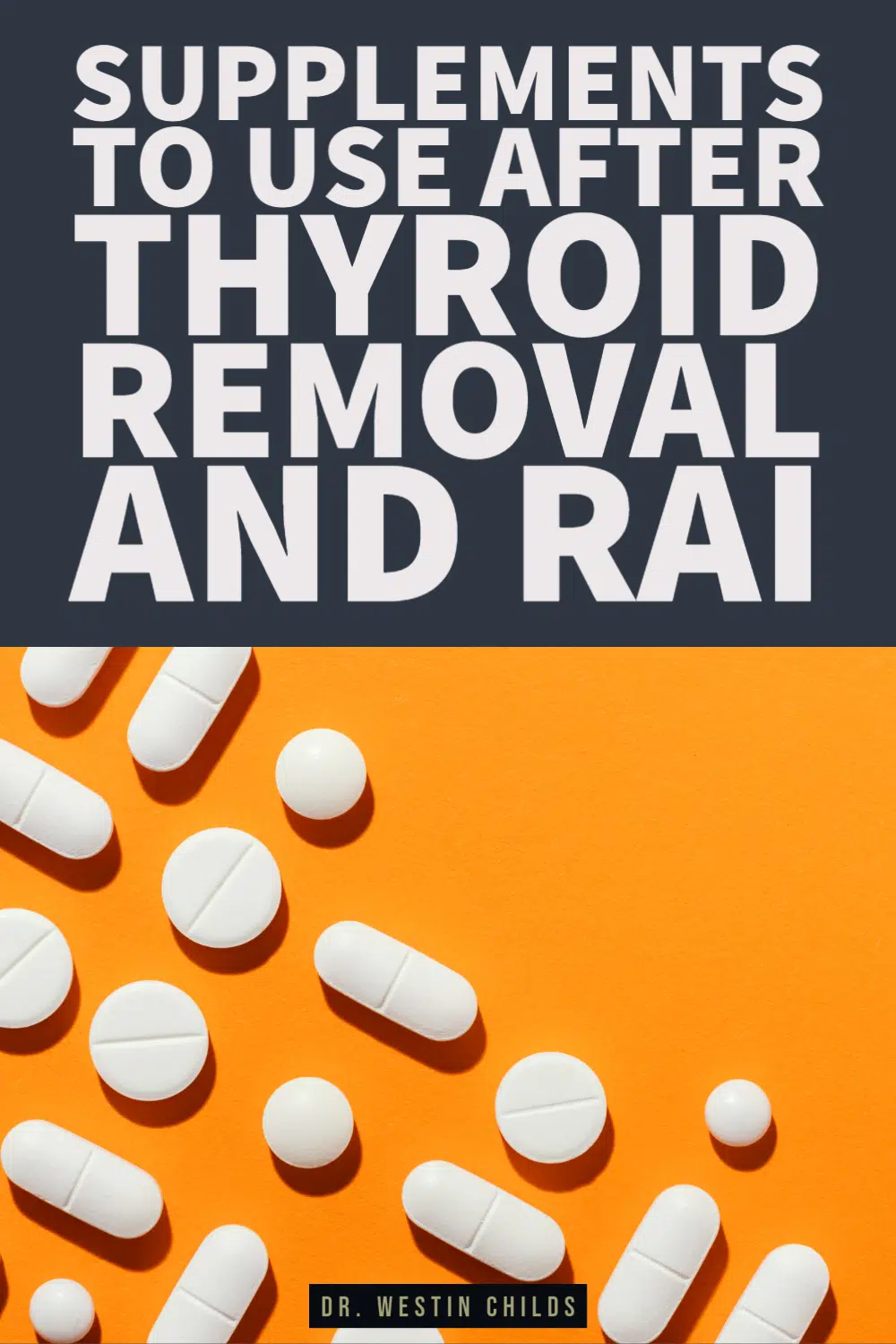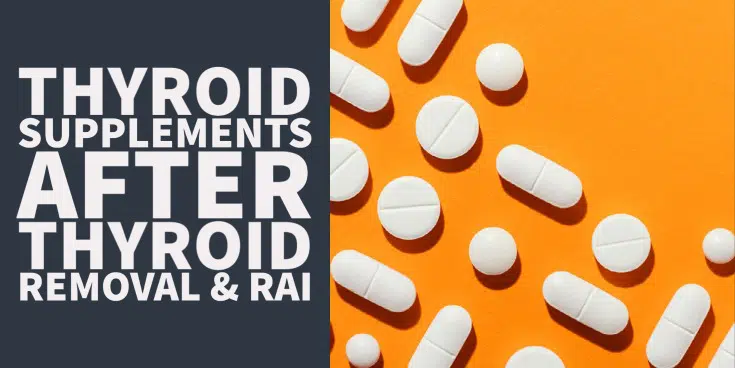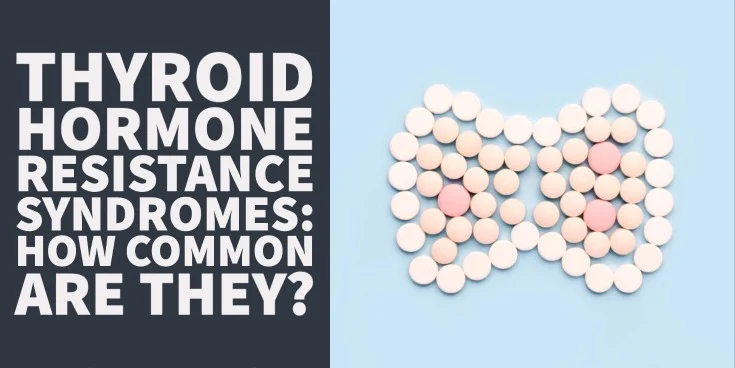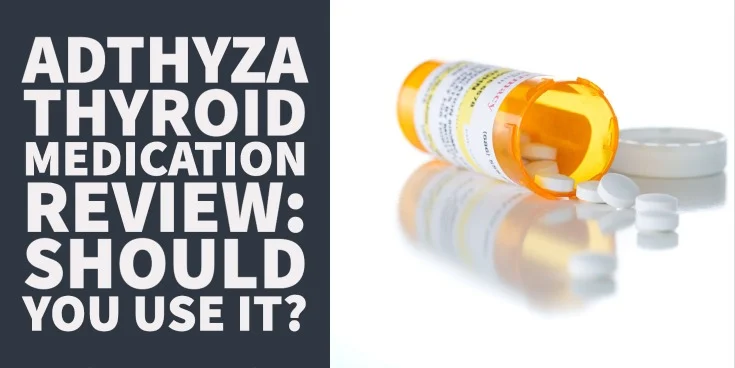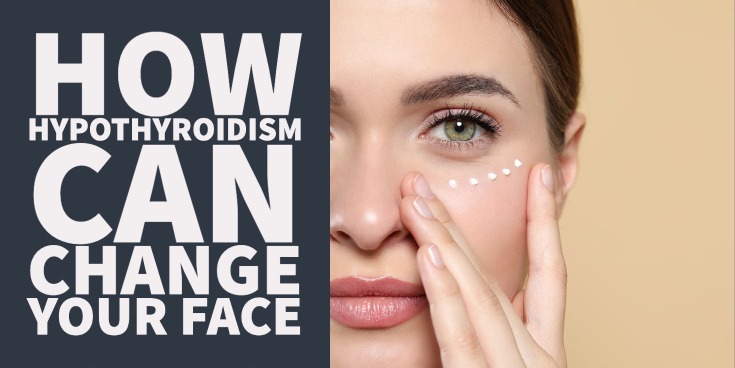This is probably one of the most common questions that I get asked on a daily basis!
And the answer is almost always yes.
Even though it may not seem intuitive, your body can still benefit from the use of thyroid-specific supplements even if you do NOT have a thyroid (or if it’s been destroyed).
The reason for this is actually quite simple and it’s something we are going to go into detail below.
This article will help you understand why thyroidectomy and post-RAI patients can still benefit from thyroid supplements, how your thyroid can still be slowed down by certain issues, and why just because you are taking thyroid medication doesn’t mean that your body is getting what it needs.
Let’s jump in:
DOWNLOAD FREE RESOURCES
Foods to Avoid if you Have Thyroid Problems:
I’ve found that these 10 foods cause the most problems for thyroid patients. Learn which foods you should avoid if you have thyroid disease of any type.
The Complete List of Thyroid Lab tests:
The list includes optimal ranges, normal ranges, and the complete list of tests you need to diagnose and manage thyroid disease correctly!
You Are Hypothyroid Now
If you do not have a thyroid or if it’s been destroyed by radioactive iodine you should consider yourself to be hypothyroid.
This may seem confusing to you at first, especially when you consider that most people who have either of those procedures listed above do so for the condition of hyperthyroidism (usually), but it’s true.
Once your thyroid has been removed (either surgically or damaged through radioactive iodine) it no longer works and you are now 100% reliant upon thyroid medication to sustain your body.
There are some situations in which this isn’t true, such as those who have only had their thyroid partially removed and those who have only had half or a portion of their thyroid destroyed from radioactive iodine.
But for the purpose of this article, I am going to operate under the assumption that you have MOST (90+%) of your thyroid removed or destroyed.
And if you fit into either of these categories you are absolutely hypothyroid now.
The only difference between you and someone who has a condition like Hashimoto’s thyroiditis is that they have a non-functioning thyroid gland in their body, while you simply don’t have one at all.
In fact, end-stage Hashimoto’s thyroiditis is very much akin to those who have undergone radioactive iodine ablation because both conditions result in an atrophic and completely damaged thyroid (1) which no longer produces thyroid hormone.
Because of this, both parties MUST take thyroid medication to survive and, hopefully, thrive.
But, there’s a catch.
Not everyone without a thyroid does well on thyroid medication (2).
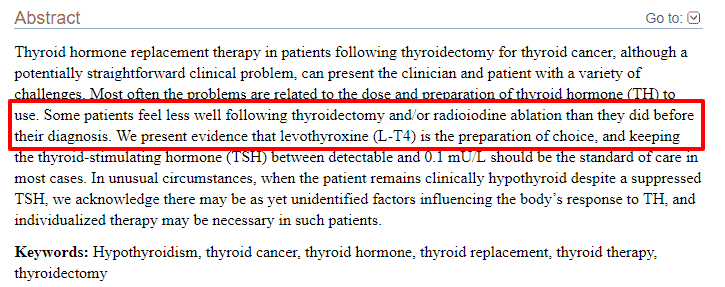
The Problem with Thyroid Medication
And the reason for this is multi-factorial but it has to do with the type of thyroid medication you are using, the dose you are taking, the time of day that you take it, your nutrient status, your genetics, and more.
Each of these factors plays together to influence just how effective your thyroid medication will be and how it will make you feel.
I won’t go into these factors in detail but you can read more about how they influence your body and your symptoms in the links listed above.
Most people who take thyroid medication after RAI or thyroidectomy notice that they still continue to experience some minor symptoms of hypothyroidism.
It’s not uncommon for these people (perhaps even you) to experience such symptoms as weight gain (3), fatigue (4), cold intolerance, hair loss, and so on.
All of these symptoms point to the fact that your thyroid levels are not optimized in your body.
And this is what drives so many people with these symptoms to seek out supplements as a way to augment their thyroid medication.
And these supplements may actually be beneficial and help your thyroid function.
One of the main questions that people have once they get this far in their thought process is whether or not these supplements will work for them.
After all, they DON’T have a thyroid.
The good news is that the vast majority of information that you see me write on my blog about hypothyroidism is relevant for those with a thyroid and even for those WITHOUT a thyroid and I’m going to explain why below.
Nutrients That Help Your Thyroid (Even if you Don’t Have one)
Supplements work by providing your body with specific and certain nutrients that are required for your cells to function.
These nutrients help your body produce proteins, enzymes, DNA, RNA, hormones, and so on.
If you don’t have a sufficient amount of these nutrients then your thyroid function may start to suffer or even be reduced.
This is especially true even if you are taking thyroid medication!
And this information still applies whether your thyroid is there or not, whether it has been removed surgically, or whether it has been fried with radioactive iodine.
Your body NEEDS these nutrients.
It’s important for you to realize that these nutrients work in almost EVERY cell in your body.
So even if you don’t have a thyroid there is still a need for ALL of these nutrients!
Let’s take a minute to explain how these nutrients work, why they are still important for your body, and what can happen if you supplement with them.
#1. You STILL Need Iodine
Iodine is one nutrient that almost everyone is familiar with, whether you have a thyroid issue or not.
Iodine is probably the most important nutrient in your body as it relates to thyroid hormone because it is necessary for thyroid hormone production.
If you don’t have iodine then you won’t be able to produce thyroid hormone and you will become deficient (5).
You may be tempted to think that because you don’t have a thyroid gland, and your body can’t produce thyroid hormone on its own, you don’t need iodine.
And that’s where you would be very wrong.
While it is true that iodine is no longer necessary for thyroid hormone production if you don’t have a thyroid gland (and if you are taking thyroid hormone), it is still important for other cells in your body!
Tissues such as the skin, breast, and brain tissue still require iodine for cellular function and a reduction in iodine may cause symptoms such as cystic acne, fibrocystic breast disease (6), and developmental issues.
Iodine is also important because the only way that humans can obtain iodine is through their diet.
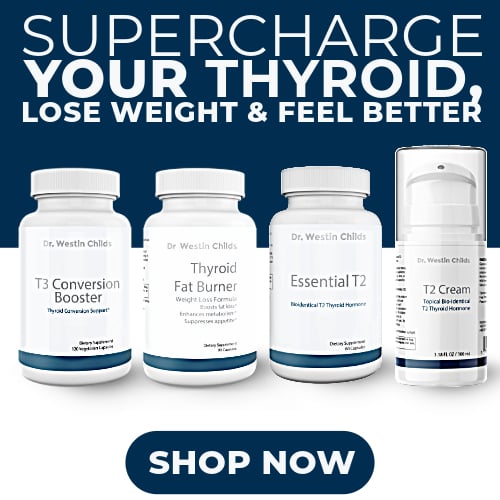
So if you aren’t consuming foods that are naturally high in iodine (or taking supplements) then there is a chance your levels may be sub-optimal.
Does that mean you need to run out and start taking iodine?
Not necessarily, but I am using this as an example to illustrate a larger point and that is that nutrients are still helpful for the body if you don’t have a thyroid gland.
You can ensure you are getting enough iodine by consuming at least 150mcg per day (this isn’t a hard and fast rule, but you can learn more about the nuances of supplementation here).
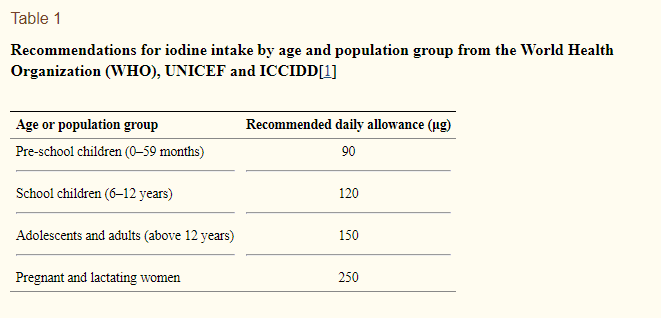
If you are pregnant or lactating then the amount that you need will be higher.
#2. You STILL Have to Convert T4 to T3
One of the most important factors to consider when you look at supplementing for your thyroid is how well your body is converting T4 into the active T3 thyroid hormone.
How well you convert T4 into T3 is MORE important for people without a thyroid than it is for those with a thyroid.
Why?
Because those people with a thyroid gland can still produce some amount of T3 thyroid hormone whereas those without a thyroid gland cannot produce any.
And this is a big problem because most doctors (endocrinologists and primary care physicians) will NOT prescribe T3 medications.
We won’t get into why that is for this article, but just realize that they typically do not prescribe this type of medication for those people who don’t have a thyroid.
This is a problem because T3 is the most active thyroid hormone in the body. In fact, T3 does all of the work of thyroid hormone in the body.
Most of you reading this, especially if you don’t have a thyroid, are probably taking a medication such as levothyroxine or Synthroid.
These medications contain ONLY the thyroid prohormone T4 or thyroxine.
This means that your body MUST convert that T4 into T3 or else it won’t work.
And in this case, you are at a disadvantage compared to those people with a thyroid gland (even if it doesn’t work that well) because they can produce some T3.
Because of this, it’s even more important to ensure that your body has all of the nutrients it needs to convert T4 into T3.
And there are several nutrients involved in this process including Zinc and Selenium.
Low levels of Zinc and Selenium may predispose you to lower levels of free T3 (which can be tested for) and the symptoms I described above.
It’s important to know that other factors can also influence how well your body converts T4 into T3 including things like inflammation, stress, infections, the food that you eat, and so on.
My purpose for talking about conversion in this setting is to let you know that certain nutrients can enhance this process and help your thyroid function.
#3. You STILL Need Your Cells to be Sensitive to Thyroid Hormone
Lastly, we need to talk about how receptive your cells are to the thyroid hormone that is floating around in your bloodstream.
It may be tempting to think that the thyroid hormone you take by mouth has no problem getting absorbed into your body, getting activated by the right enzymes, and turning on the right cellular processes, but this isn’t the case for many of you.
Problems can arise at any level and that is also true at the cellular level.
The last step that must occur before your body is ready to use thyroid hormone is cellular activation through cellular receptors.
Even if all of the other steps occur normally if the last step doesn’t occur then you may not see as much improvement as you’d like.
When it comes to the cellular level, there is competition for thyroid binding from 2 different sources.
The first is from the anti-thyroid metabolite reverse T3 and the second is from thyroid sensitivity due to nutrient deficiencies.
If your body doesn’t produce enough T3 then it may produce too much reverse T3 (referred to as rT3).
In addition, your cells can become resistant to thyroid hormone (7) under certain conditions.
This problem is similar to what occurs in other hormone-resistance syndromes.
Insulin resistance, leptin resistance, and cortisol resistance all occur when your cells are less responsive to normal healthy levels of hormones.
It may be possible to “sensitize” your cells to thyroid hormone by treating your conversion issue (by reducing rT3 conversion) and by taking certain nutrients including Vitamin E and Vitamin A.
Supplementing Without a Thyroid
I’ve spoken generally about supplementing without a thyroid (or if your thyroid gland has been damaged from radioactive iodine), but I want to leave you with some specifics as well.
Here are some tips to consider if you want to supplement and you don’t have a thyroid:
- Taking thyroid support supplements can potentially help the thyroid hormone in your body.
- All supplements from my website are safe to use whether you have a thyroid or not. This includes Thyroid Adrenal Reset Complex, T3 Conversion Booster, Thyroid Hair Regrowth Complex, and Thyroid Chill. All probiotics and protein powders are obviously safe as well.
- If you choose not to use my supplements then look for supplements that have similar ingredients from reputable suppliers.
- You can safely avoid “Thyroid Supplements” which primarily help your thyroid gland produce more thyroid hormone (these aren’t helpful if you don’t have a thyroid gland).
- You can safely supplement with nutrients that SUPPORT thyroid function at the cellular level and those supplements that support T4 to T3 conversion.
- Probiotics are a safe and effective way to improve gut function and should be considered for all patients without a thyroid.
- You do not need to take excessive doses of iodine if you don’t have a thyroid gland but a small dose may be helpful to supplement whatever iodine you are getting from your diet.
- Taking adrenal supplements, while they won’t help your thyroid gland directly, can still help improve your stress response and improve thyroid conversion. This includes adrenal adaptogens and adrenal glandulars.
- Taking supplements is a great way to improve your thyroid but you may also need to adjust your thyroid medication. Remember: supplements are NOT a substitute for thyroid medication (though they can help you feel better).
- Get as many vitamins and nutrients from your diet as possible. But do note that even if you are eating a healthy diet you will still probably not be able to get 100% of the nutrients you need from your thyroid on a daily basis. For this reason, I find that most hypothyroid patients do better on thyroid supplements.
Conclusion
I hope this information was helpful to you!
The world of thyroid management is already confusing enough, but let me recap some of the most important points here.
People who have had their thyroid removed or destroyed are now considered to be hypothyroid, this is true even if their original diagnosis was hyperthyroidism.
These same patients can still benefit from the use of thyroid-specific supplements and nutrients.
These nutrients work because they focus on helping the thyroid do its job at the cellular level, by helping the enzymes in your body, and by promoting T4 to T3 conversion.
All of these processes still occur in the body whether you have a thyroid gland or not and whether you are taking thyroid medication.
But, because you don’t have a thyroid gland, you can stay away from taking supplements designed to help promote thyroid hormone production in the thyroid gland (these don’t do you any good).
If you have any questions, especially those that I didn’t cover here, please leave your questions or comments below!
I will be continuing to update this page with information to help those without a thyroid.
Now I want to hear from you:
Are you confused about your thyroid?
Are you still feeling poorly after your thyroid removal?
Have you tried taking supplements before?
Did they work for you? Why or why not?
Scientific References
#1. https://www.ncbi.nlm.nih.gov/pubmed/11515732
#2. https://www.ncbi.nlm.nih.gov/pmc/articles/PMC4737508/
#3. https://www.ncbi.nlm.nih.gov/pubmed/11917349
#4. https://www.ncbi.nlm.nih.gov/pmc/articles/PMC4773544/
#5. https://www.ncbi.nlm.nih.gov/pubmed/15142639
#6. https://www.ncbi.nlm.nih.gov/pubmed/8221402/
#7. https://www.ncbi.nlm.nih.gov/pmc/articles/PMC2928892/
